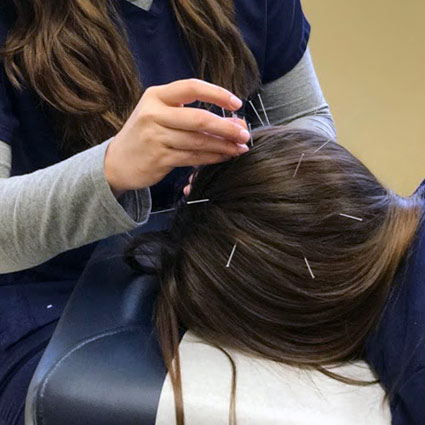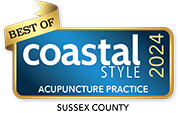Acupuncture & Oriental Medicine
for the Delaware Area
Offered At Our Lewes,
Rehoboth Beach, and Wilmington Locations

Oriental Medicine (OM) pre-dates modern western medicine by several thousand years. It has grown and developed into a comprehensive health care system with a continuous history of over 2,300 years.
Today, Oriental medicine is widespread and has touched every part of the world. Oriental medicine is the result of generation after generation of doctors and scholars observing both the principles of the natural law of nature, and the different phases of life’s natural cycles: Change, Growth, Balance, and Harmony. Temperature and climate changes such as heat, cold, dampness and dryness were also studied, as well as their affects on both nature and man.
The mind and body share a very powerful connection, even today with all the technologies we have, scientists tell us we only use a very small percentage of our brain. Oriental Medicine has been observing the symbiotic connection between our minds and our emotions for over 2,300 years.

Oriental Medicine is a complex and natural method of medicine. The goal of Oriental medicine is to seek harmony and balance between the mind and body, and also to enable the body’s natural ability to function and regulate itself.
The Practice of Oriental Medicine includes:
- Acupuncture
- Herbology
- QiGong – Breathing and stretching exercises which increase oxygen and blood flow to the body as well as to help increase range of motion to the joints.
- Tuina Chinese medical massage
- Nutritional recommendations and Lifestyle counseling
Oriental medicine influences the body in these following ways specific and unique to each individual:
- Promotes health and well being for both mental and physical conditions simultaneously.
- Its immediate effects include a sense of well-being and relaxation, as well as reduced anxiety and depression.
- Prevents illness
- Treats multiple illnesses based on generations of clinical experience.
- Serves as a general balancing treatment, treating not only symptoms, but also the root cause of those symptoms.
- General calming and relaxation of the body allows it to be better able to respond to other forms of treatment (ie: chiropractic, massage, etc.)
Cupping, an ancient method of healing, involves suctioning the skin, muscle, fascia, and blood vessels on specific meridians or affected regions of the body. This technique traces back to the early fourth century when hollowed out animal horns were placed on certain areas of the body to initiate the healing process.
Today, cupping has evolved to utilizing glass or plastic “cups” that allow a varying degree of suction to a particular acupoint, meridian, muscle, or trigger point. Cupping works within the soft tissue by drawing toxins up and out of the body. Gentle yet effective, the technique has been described as a ‘reverse massage.’ To learn more, read our blog post all about cupping.
Energy flows through passages in the body known as meridians, which can become blocked. During an acupressure procedure, pressure is applied to points along the meridians to clear the blockages. Acupressure uses the same points and meridians throughout the body as acupuncture, but instead of using needles, a therapist applies a gentle to firm finger pressure. When these points are stimulated, they stimulate the body’s natural self-curative abilities, release muscular tension and promote healthy circulation of blood.
Acupressure has been effective at helping manage nausea and vomiting, helping lower back pain, tension headaches, stomach ache, and many other ailments.
Dry needling is a technique used to relieve pain or improve the range of motion of muscles. The procedure relieves muscular tension and spasm often associated with arthritis, nerve irritation, muscular strain, ligament strains, and herniated disks. A dry needle, without medication or injections, is inserted through the skin and into areas of the muscle known as trigger points. Dry needling can be used to target trigger points that are not otherwise manually palpable.
Acupuncture is one of the modalities of Oriental medicine. Acupuncture consists of the insertion of extremely fine, sterile, stainless steel needles into certain locations on the body at specific points shown to be effective in the treatment of specific health problems.
These points have been mapped by the Oriental medicine doctors for over 2,300 years, and there are more than 1,000 known acupuncture points. In the past three decades electromagnetic research has confirmed the existence and location of these points. The points are like switches on a circuit breaker for regulating and balancing the body.
How does Acupuncture work?
Modern Western medicine cannot yet explain how acupuncture works. Modern Western medicine cannot yet explain how acupuncture works. Acupuncture is based on ancient theories of the flow of qi (a fine, essential substance which nourishes and constructs the body) through distinct channels that cover the body somewhat like nerves and blood vessels.
According to this theory, acupuncture adjusts the flow of qi in the body, leading it to areas where it is insufficient and draining it from areas where it is stuck and / or superabundant. In this way, acupuncture restores the harmonious balance of the body and its parts. In Chinese, there is a saying, “if there is pain, there is no free flow: if there is free flow, there is no pain.” Acupuncture promotes and reestablishes the free flow of qi.
Does it hurt?
What is Chinese Herbal Medicine?
Can herbal medicine be used at the same time as Western Medicine?
What is Oriental Medicine good for?
Over the last several years many hospitals and universities across the country have been doing studies on the positive effects of acupuncture. Many of these hospitals have also created integrated healing centers inside the hospital setting, so that patients can receive conventional medicine and Oriental Medicine in one place. The integration of the two medicines has opened the doors for patient’s to receive the best of both worlds. Included among the hospitals that have integrated Oriental Medicine include; Duke Medical University, Thomas Jefferson Hospital, and Johns Hopkins Medical Center.
Acupuncture and Oriental Medicine is recognized by the National Institute of Health (NIH), Complementary and Alternative Medicine (CAM) and the World Health Organization (WHO) to be effective in the treatment for over 40 common disorders. In addition, Oriental Medicine has been used for centuries throughout Asia to treat hundreds of other problems.
Is OM Safe?
Caution: The improper use of Chinese Herbal Medicine can be dangerous. Please consult with a licensed acupuncturist before taking any herbal products.
In acute conditions, results with herbal medicine can be expected in a matter of minutes. In chronic conditions, some results should be seen within two weeks. Although chronic conditions may require taking Chinese herbal medicine for a long time, signs that the medicine is working should be apparent to the patient and practitioner almost from the very start.
Is there anything I need to do before receiving an acupuncture treatment?
Wear loose clothing. Women should not wear one piece dresses. Avoid wearing stockings
Is there anything I need to do while receiving acupuncture?
Do not change your position or move suddenly. If you are uncomfortable, tell your practitioner.
Are all the herbs vegetable in origin?
Although called Chinese herbal medicine, OM practitioners use ingredients from all three kingdoms: vegetable, animal, and mineral. However, the majority are from vegetable sources. Leaves, flowers, twigs, stems, roots, tubers, rhizomes, and barks are some of the vegetable parts used.
Can pregnant women take Chinese herbs?
Can children take Chinese herbal medicine?
Does Chinese herbal medicine have side effects?
Get Started Today
Ready to get started? Contact one of our locations and schedule an appointment today!
REQUEST APPOINTMENT »

